
The suit alleges that WFA and GARM conspired with dozens of advertisers and others, to collectively withhold billions of dollars in advertising revenue from X. The suit argues that’s that the boycott enacted was an attempt to force Twitter to adhere to certain brand safety guidelines they wanted.

In order to be a member of GARM, you must agree to adopt, influence, and enforce their “brand safety standards.” One condition of this is withholding your ad dollars from platforms GARM and WFA deem to be “non-compliant” with THEIR “brand safety standards.” They say the word, and advertisers boycott to keep their membership.

There was a mass boycott after Twitter's ownership changed hands. As per the complaint, even some advertisers wanted to begin advertising on Twitter again and went to GARM for “permission.” These actions were counterintuitive to their own self-interest as brands.

GARM celebrated an 80% reduction in ad revenue for Twitter. The actions they (and the advertisers) took are counter to a free marketplace. Here is where the anti-trust comes in—these advertisers took action COUNTER to their economic interests BECAUSE of their membership in this parent organization. If there was a competitive market, each platform would set the standards best for that platform, and the sheer efficiency of those standards would dictate the success (or failure) of advertisers.

The brand safety standards set by GARM are ideological—and so they would likely fail in the marketplace of ideas. That’s me saying that the complaint is much more…kind. The complaint alleges that the collective group of advertisers is overriding the actual consumer—kind of counterintuitive unless your mission *is* to spread an ideological message. Why else would you do things clearly counter to the success of your business?

This lawsuit was filed after the House Judiciary Committee's report concluded that their conduct was likely illegal under antitrust laws…

NOTE: I am not going to thread all of the party information, but they are taking care inside their descriptions to explain why venue and jurisdiction are proper. The defendants' inevitable first filing will be motions to dismiss or move venue or to argue that they can’t be sued at all because they are international and HQ elsewhere.
The Steer team is what guides GARM, and the biggest advertisers in the world are on that team. They’ve got the “Big Six” ad agency holding company, which represents nearly every major ad agency in the world. In short, every single advertiser is manned here, and GARM members exercise market power in the ad market.

Importantly, they make it clear themselves. In an email discussing potential interaction with Facebook, they said:

They proclaim their monopoly and ideologically driven mission in their charter. They recognize that they may have to put their own competitive concerns aside “in the interest of safety.” Given their ideological bent, their definition of safety is likely not YOURS.

By adhering to this and eliminating competition, they are able to advance their desired outcomes—outcomes that would have been impossible if all of these advertisers hadn’t set aside their interests and worked together—newly unburdened by what has been.

They even state that their goal is to remove what *they* deem “harmful content” from platforms by exercising this muscle. No ad dollars? Platforms influence their content moderation, etc. Diabolical.

They also brag about strong-arming Meta into their policies. In those words. As they put it—“speaking softly and carrying a big stick.”

The next several pages discuss in detail the structure and policy arms of GARM. There are several working groups that determine the definition of words, what they want their advertisers to consider “safe,” different types of content, etc. It is troubling, to say the least.
An interesting note: the implementation of GARM forces costs formerly on advertisers onto the platform instead. This hurts the end user and the platform. Because they control the entire marketplace—the advertisers were able to force platforms into their standards.
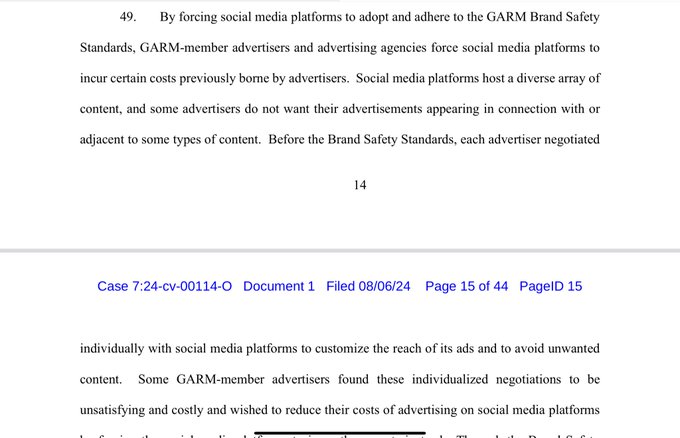

Not only do the companies in GARM promise to adhere to the safety standards when placing ads, but they must also make those same changes internally. This is shocking.

They are also required to pass these standards on to third parties. Essentially, GARM has captured the entire corporate world into its agenda—or else. I am going to go out on a limb and say that most of these corporations probably wish this wasn’t the case. You would likely be surprised.

The charter literally REQUIRES that companies DO NOT compete with one another in the execution of their goals—the true definition of a monopoly, or as I would personally call it, corporate fascism.

This really is sinister. From time to time, GARM will threaten platforms, using the might of their ad dollars, to get back in line with what they want.

They also have a “Next Door” type gossip line—Coca-Cola reaching out to their friends to see who is potentially boycotting Spotify should they not get in line—even though Spotify JOINED GARM.
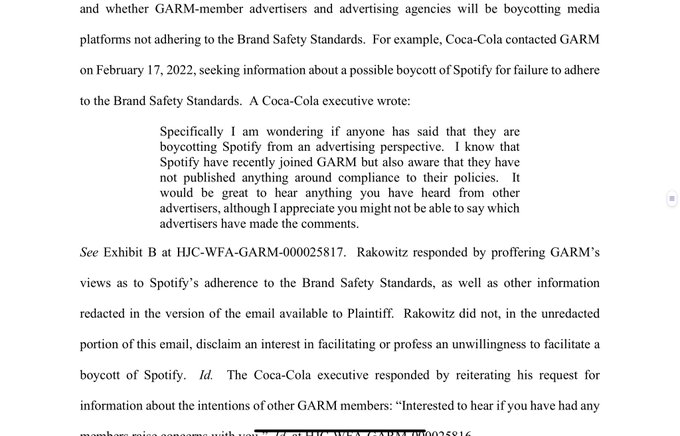
All of these folks always sound the same—whether it’s Flaherty to Meta, or GARM to its partners—they demand compliance or else, like little dictators. Here is an email to Spotify by Rakowitz at GARM after Coca-Cola raised its hand to tattle. (I’m sorry, that is what this is)
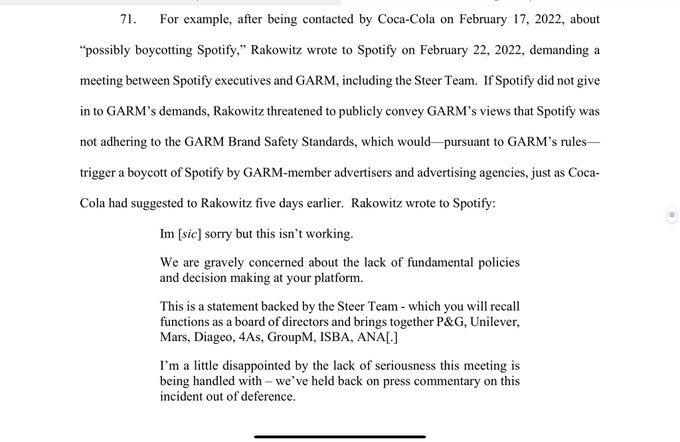
Here is the (passive-aggressive) end of that email to Spotify:

After Musk bought Twitter, they got scared. They wanted Twitter to remain committed to GARM’s standards. They organized a boycott of Twitter. Remember, they have 90% of all ad power in THE WORLD wrapped up in their organization—devoid of any competitiveness.
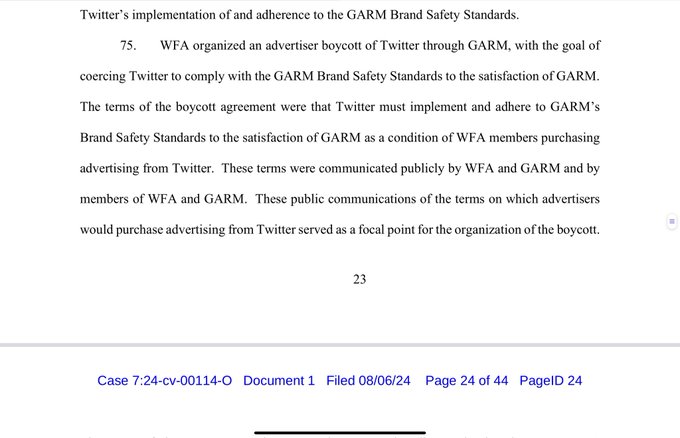

“The stakes are simply too high…” regarding X following the GARM standards. It leads one to wonder what exactly these people think they are doing. If I am not mistaken, companies exist to sell products to consumers, not to ideologically police the world. Good service—consumer. That is how it is supposed to work.

And they introduced the boycott of Twitter…right out in the open.

Musk met separately with advertisers and assured them of his intentions, but it didn’t matter. GARM continued with the boycott, including having advertisers reach out independently to GARM for guidance because of the importance of Twitter.

Truthfully, they have GARM dead to rights here—companies wanted to place ads but deferred to GARM for permission.* This is capture.

This company really wanted to advertise here. They noted that advertisers were pulling their ads, but they wanted to present another proposition. GARM was more interested in compliance.

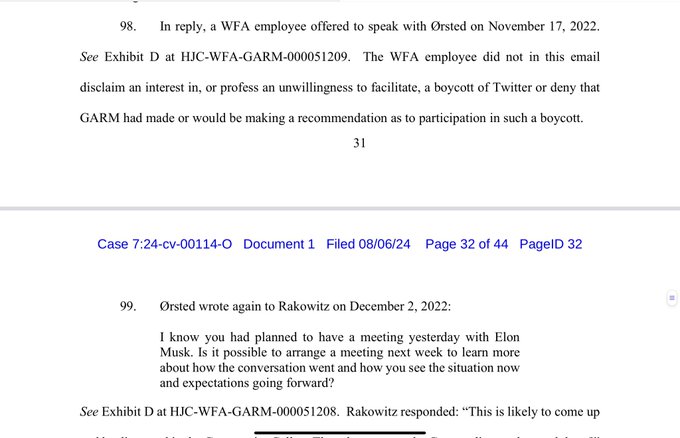
Even good faith was met with threats. Musk met with GARM and agreed to implement some of the standards. (Tsk tsk, IMO.) Instead, GARM used their next meeting to threaten Twitter and state its non-compliance.


GARM used this to (essentially) wield a big stick against a major platform, and cause others to acquiesce lest they also face a boycott. Quizlet was one of the organizations who reached out to make sure they were in “compliance” so they didn’t get the Twitter treatment.

So, Ørsted reaches out AGAIN a while after the full boycott and asks if there is a plan to start advertising. By now, GARM had been notified they were under the eye of the Judiciary Committee. GARM doesn’t reply, and when another follow-up email is sent, they pretend they never told Ørsted they shouldn’t place ads.
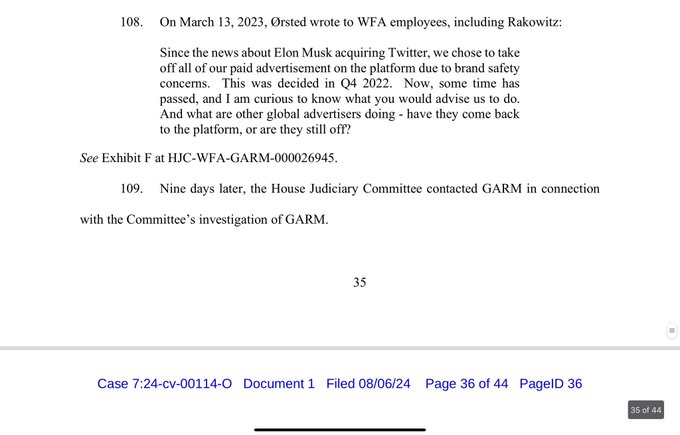

Here are the counts being alleged:




Here is the prayer for relief:

You can find the complaint and the exhibits at the following link:



